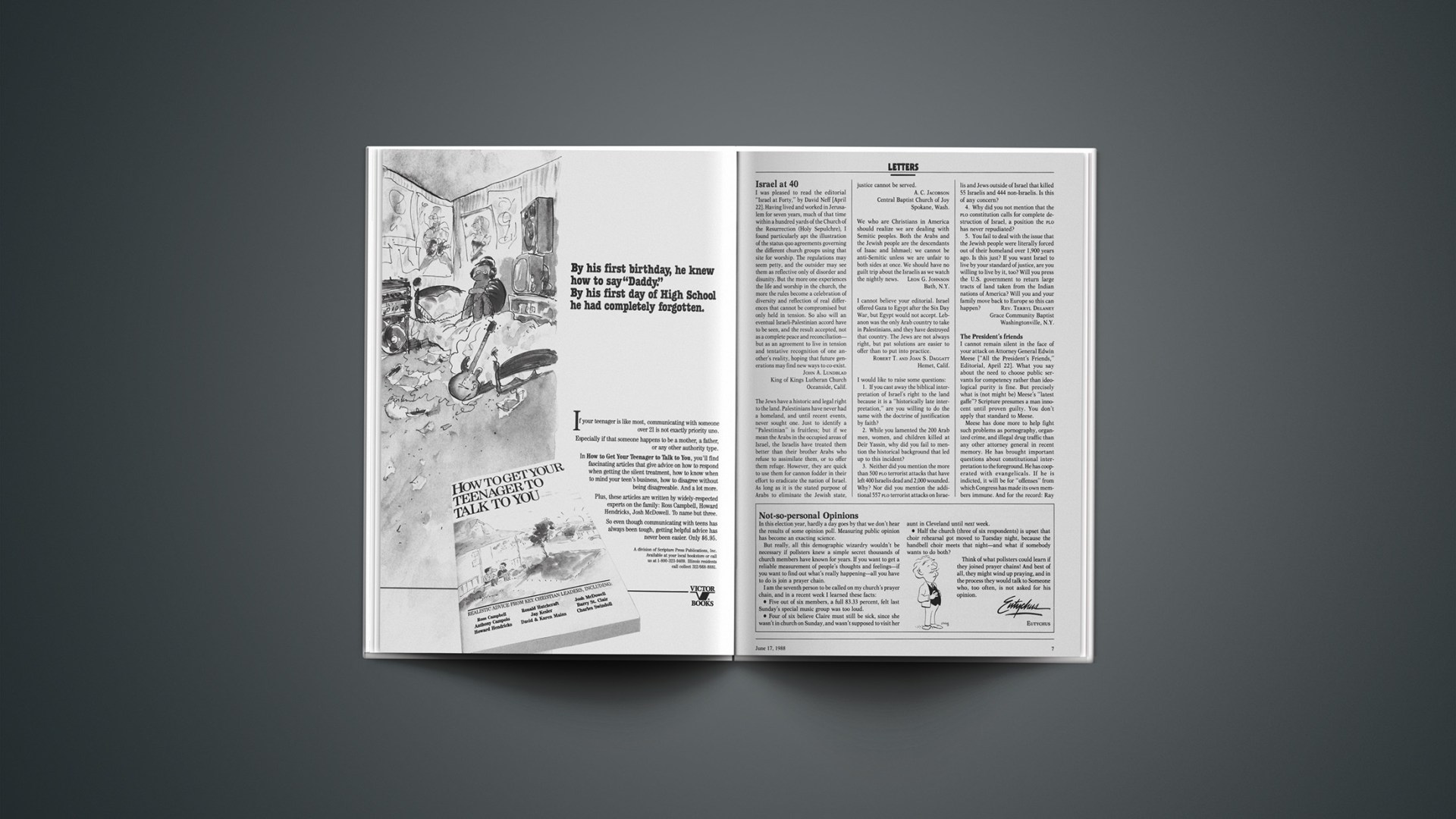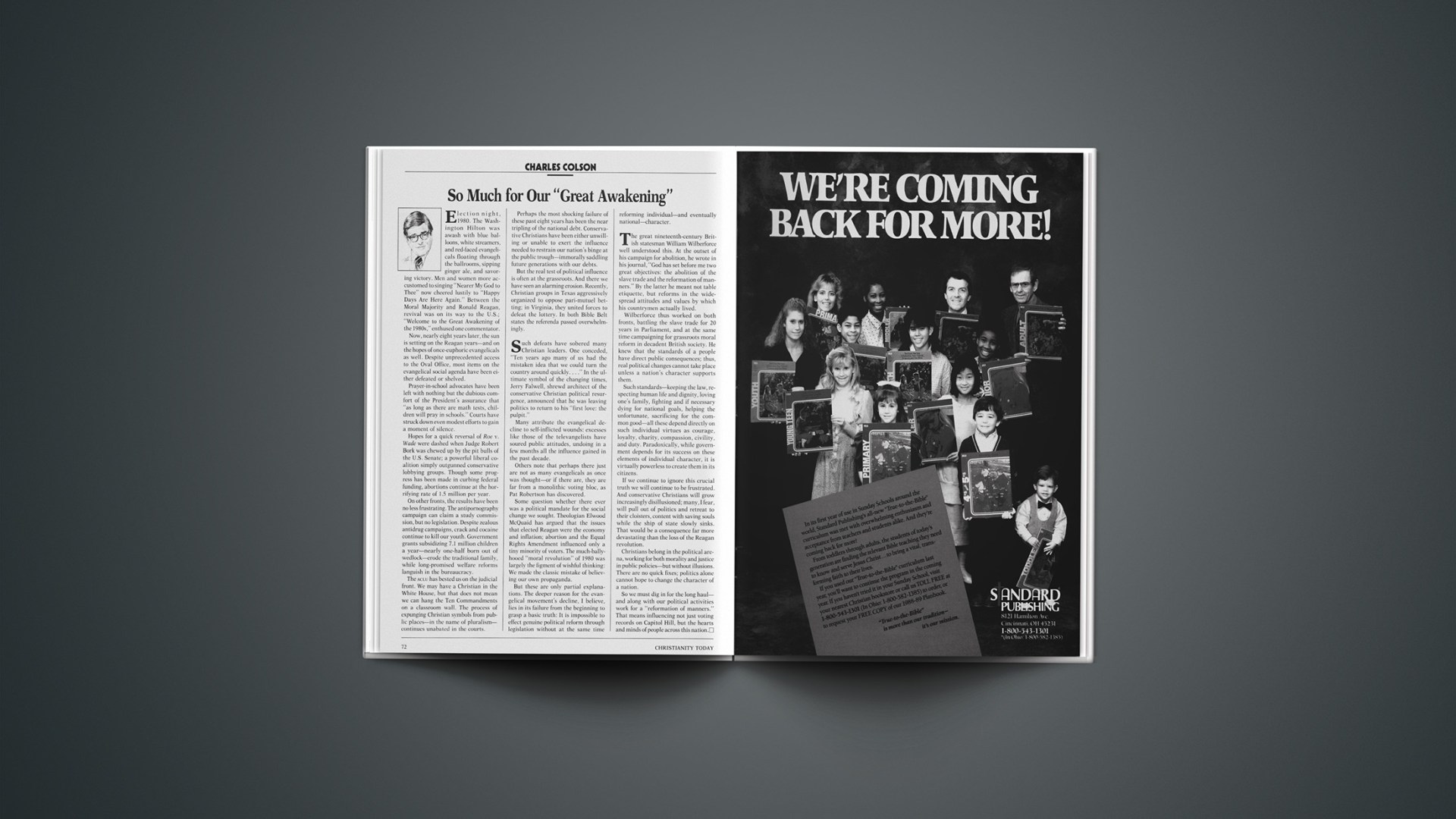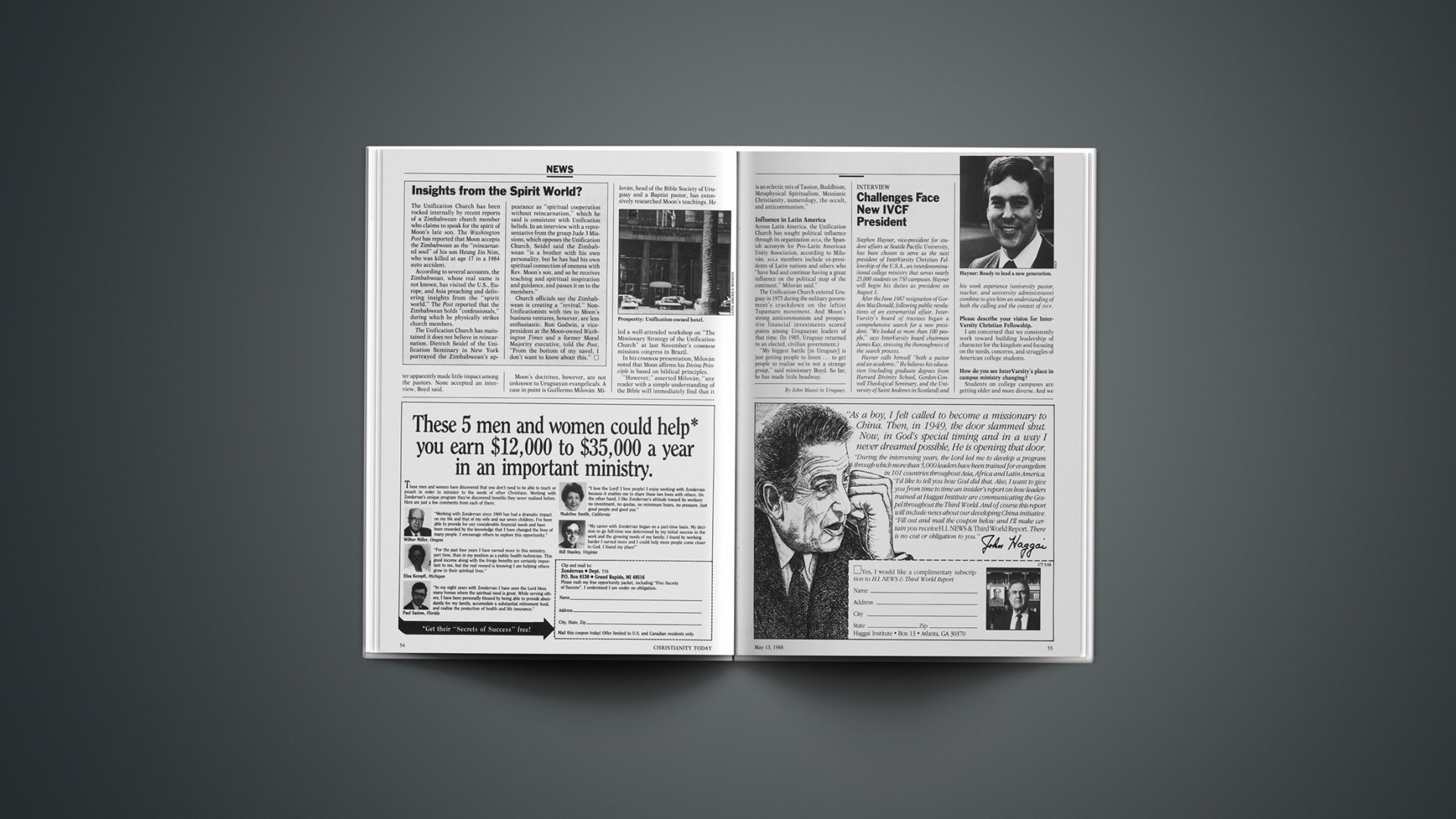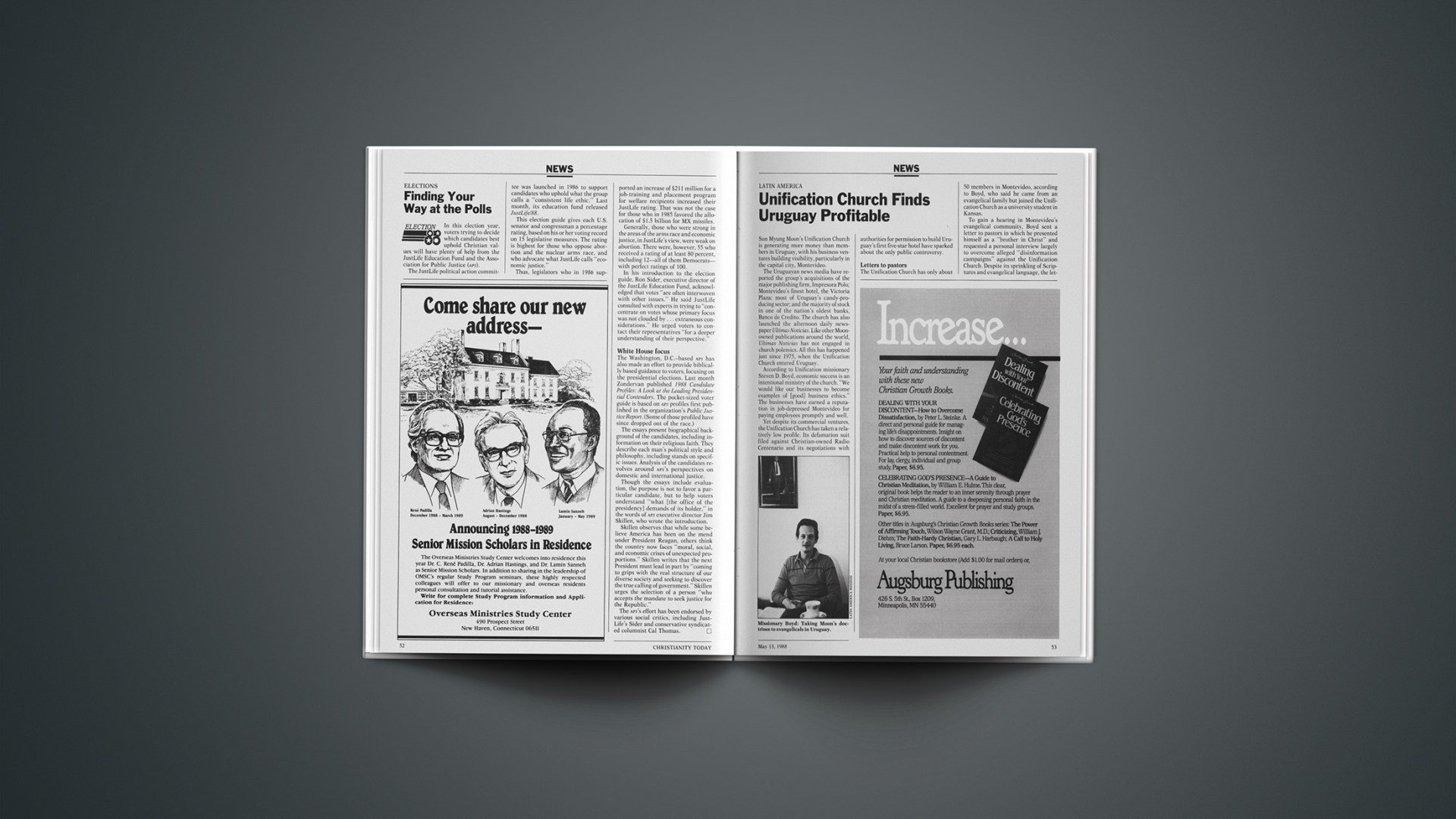The church community is crucial if we are to use our money responsibly.
In a 1987 Gallup Poll of evangelicals, five of the top seven issues considered the “most important problems facing the nation” fell into economic categories. And in a more recent survey of CHRISTIANITY TODAY readers (see p. 50), balanced budgets and budget deficits rank high on a list of concerns voters have heading into November’s election.
Crisis and confusion are the undercurrents of these pervasive concerns. Presidential candidates talk long and hard about remedying them—yet leave a bewildered electorate with little more than vague promises and the now-clichéd call for “financial responsibility.”
But what exactly is financial responsibility, anyway? And whose responsibility is it in the first place? Can good economic sense be discerned in a society whose individual spending habits and checkbook balances add up to fiscal ruin?
In fact, though government is hardly free of blame, the root cause of our economic malfeasance is us. Unless voters are individually called to their economic senses (an almost suicidal move for any would-be president), we cannot expect government or its leaders to lead us corporately into the pathway of financial responsibility. In short, if we really are concerned about finding answers to our current economic problems, we need first to save ourselves from ourselves.
Spending Frenzies
Two well-known consumer enticements underscore just how far we have taken leave of our economic senses.
The first is the lottery. Capitalizing on the universal dream of financial security, 23 states now offer their citizens an assortment of get-rich-quick games, with cash prizes ranging from extra tickets to multiple millions of dollars. And, oh, how the citizenry has responded. In 1985 alone, over $10.2 billion worth of tickets were purchased (over $180 billion if all betting receipts are included). Of course, one might expect the fact that a large percentage of the games’ participants are at or below the poverty level would give state officials pause. Think again. Even as you read this, bigger and better games (at greater odds) are being devised to lure larger chunks of the public’s cash—giving the states’ coffers, and the states’ citizens, what they want. Said one ebullient lottery official recently on the announcement of a new version of her state’s Lotto game: “We really think there’s a game for everyone.”
If there isn’t, that only means, of course, there is more money to be spent on a second passion that is almost out of control: consumer buying. Yuppie spending habits may be the talk of the media, but all Americans seem intent upon growing “another day older and deeper in debt.” And, of course, we are encouraged by advertisers and bank-card promoters to do just that.
Perhaps the most striking manifestation of our “shop til you drop” ethic is the Home Shopping Network and its multiple spin-offs. While only 20 percent of Americans have ever seen any of these mostly cable celebrations of salesmanship, and only half of them have ever bought anything “off the air,” those faithful few are spending in excess of $1.3 billion on everything from cubic zirconia jewelry to nonstick cookware.
“It’s captivating,” according to “Bubblin’ ” Bobbi Ray, one of the four salespersons for HSN’S “Home Shopping Club.” “After a while it becomes addictive—and a lot of that is not necessarily just the merchandise or just our influence. It’s the people themselves. It’s their enthusiasm and excitement that create the frenzy.” Writes media critic Kenneth Clark: “If it is not just a fad, [it] may be the most dynamic industry to emerge in the 1980s and [bring about] a profound change in the way Americans spend their money.”
Bummed And Bored
Unfortunately, reckless spending is a sin no less common in the church than the state, binding the saintly and the secular with a cubic zirconia tie. While evangelicals, as a rule, may shy away from picking weekly winning numbers, they are as subject to consumer passions as the next credit card holder. We have even established our own “consumer markets” to which we can covenant our cash and credit.
The Jim Bakkers are only the most obvious cases in point. There are other “ministries” that ultimately serve no other purpose than to secure a profit and, in so doing, exploit the donor’s already deadened sense of financial responsibility. “[Evangelical Christians] give and give and give with the false assumption that every appeal made in Christ’s name is legitimate,” bemoaned one parachurch leader. “I wish such were the case, but it just isn’t true.”
According to psychologist Gary Stollek of Michigan State University, the people who send money to television evangelists do so for the same reasons others purchase the products featured on home buying programs. They give of their finances so indiscriminately because they suffer from boredom and loneliness.
“Purchasing these products gives them the same sense of belonging,” Stollek says, “a sense of community.” It is a sense, if we read between the lines, that the evangelical donors are evidently not getting from their local churches.
Psychologist Stollek thinks men and women are desperate to make contact with the world, to feel a part of a community whose values give meaning to their own lives—even if that meaning translates to something as shallow as “shop til you drop.”
Community Giving
If Stollek is right, giving people a community to belong to may well be the first step in building a consensus regarding the meaning of financial responsibility. And there is no better institution for moving us toward this much-needed economic understanding than the church.
Although too infrequently heeded, the teachings of the church on money are clear: When our point of reference is service to others, we strip materialism of its mystique and majesty. (It becomes a servant rather than a taskmaster to be served.) And only when we put the physical, emotional, and spiritual needs of others above our own—a modern-day contradiction understood only through the love of Christ for mankind—does a responsible use of our materials even become a possibility.
This is the fiscal vision of the church, and one that must be actively promoted within the context of the body of Christ. Indeed, the church’s real challenge is not so much to reiterate (for the eight-millionth time) the parable of the good steward, or to underscore the importance of the tithe, as it is to breathe new life into these biblical teachings in the context of what it means to be an integral part of a living, loving community: What I do with my money does have an impact on someone else, for good or ill.
It is this relational identity that gives the believer an understanding of what individual fiscal responsibility is all about. And that makes the church as community an economic answer whose time has come.
By Harold B. Smith.
Swaggart’S Worst Enemy
Jimmy Swaggart has no one to fear so much as himself. The fact that he is already back in his television pulpit proves it.
Swaggart’s scandal hurt the church—especially his erstwhile denomination, the Assemblies of God. But the Assemblies has shown itself a Christian body of truthfulness and grit; it is not easy, especially in a nation so given over to flash and cash, to confront one of your denomination’s richest benefactors. The Assemblies did so anyway. And because the Assemblies stuck to the best of its biblical and denominational tradition, we can gladly expect it to heal.
Jimmy Swaggart, on the other hand, is not so certain a candidate for healing. Swaggart’s flouting of the denomination’s discipline is symptomatic of a misguided individualism that infects the entire American church. Swaggart is not the first Christian to leave a church or denomination with specious reasons. Too often, in the spirit of an extreme individualism, the grand Reformation doctrines of sola Scriptura and sola fidei have been turned into pitiful escapes from responsibility and accountability. Each man can now take up his Bible and his faith and use them to his advantage, no matter how transparently self-serving his endeavor.
Cases like Swaggart’s indicate just how much we need to restudy and then take seriously the New Testament doctrine of the church. The New Testament is replete with counsel to look to the good of the church as a body, to seek and respect the judgment of fellow Christians, to check our overpowering human propensity for self-aggrandizement with a concern for other believers (see Phil. 2:1–4).
Church discipline, rightly understood, is not undertaken to humiliate sinners and bolster the smugness of gloating saints. Rather, it is an attempt to heal and reconcile the entire body, including the particular sinner in question. The well-known disciplinary confrontation recommended in Matthew 18, for instance, has as its aim to “win over” the sinning brother (Matt. 18:15). The basic Christian attitude is that as long as one part of the body suffers, the entire body is hindered (1 Cor. 12:26).
Swaggart’s misdeeds were clearly the actions of a troubled man. What he needs now is sustained, long-term spiritual and psychological counseling, set in the context of an encouraging, loving circle of peers. But propelled more by a contemporary spirit of individualism than of biblical community, Swaggart has departed the healing circle.
He has isolated himself from those who could have helped eventually restore his ministry with integrity. Swaggart was too impatient, too friendly with power, too short-sighted to see beyond his immediate desires and goals. Back on camera, he is holding the Bible aloft and shaking it and shouting over it as vigorously as ever. Those who were unsympathetic to the man’s preaching always found it easy to mock. Today the most damaging critic and most hurtful enemy of Jimmy Swaggart is Jimmy Swaggart.
By Rodney Clapp.












